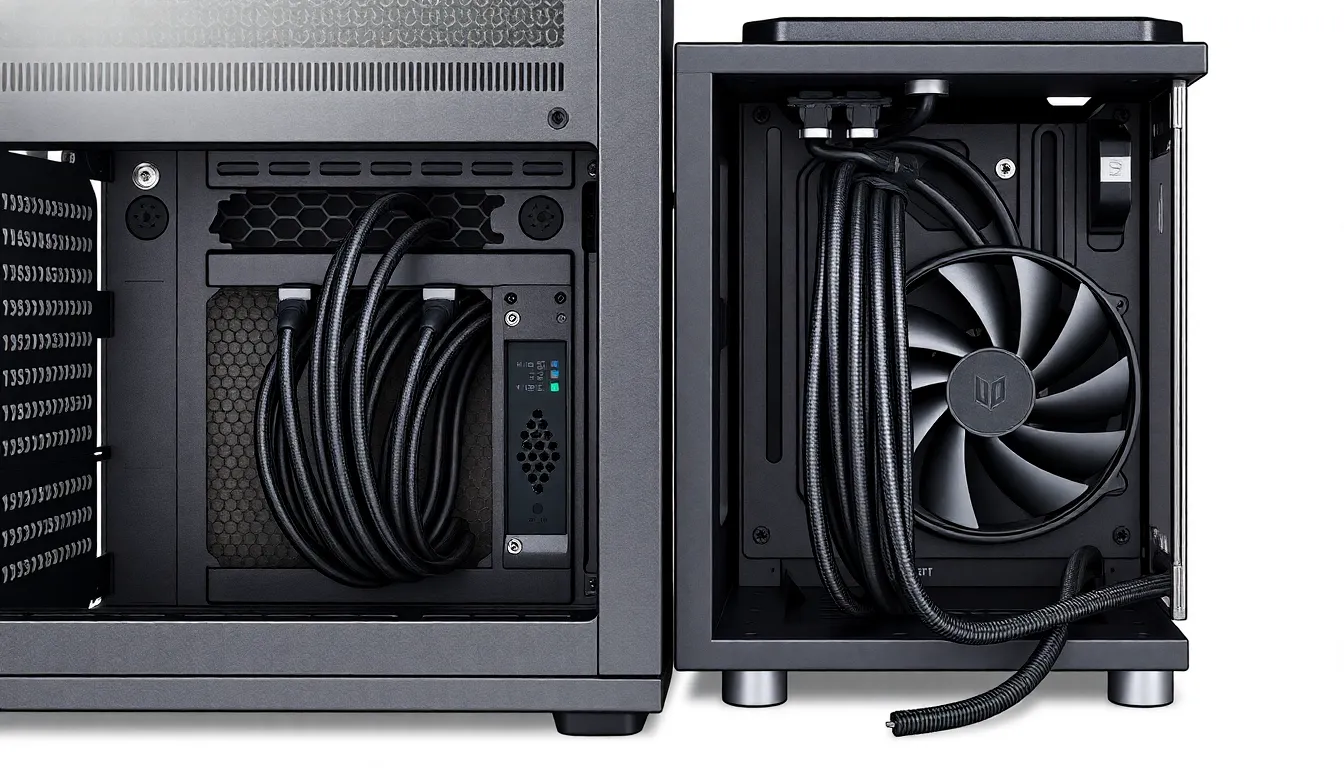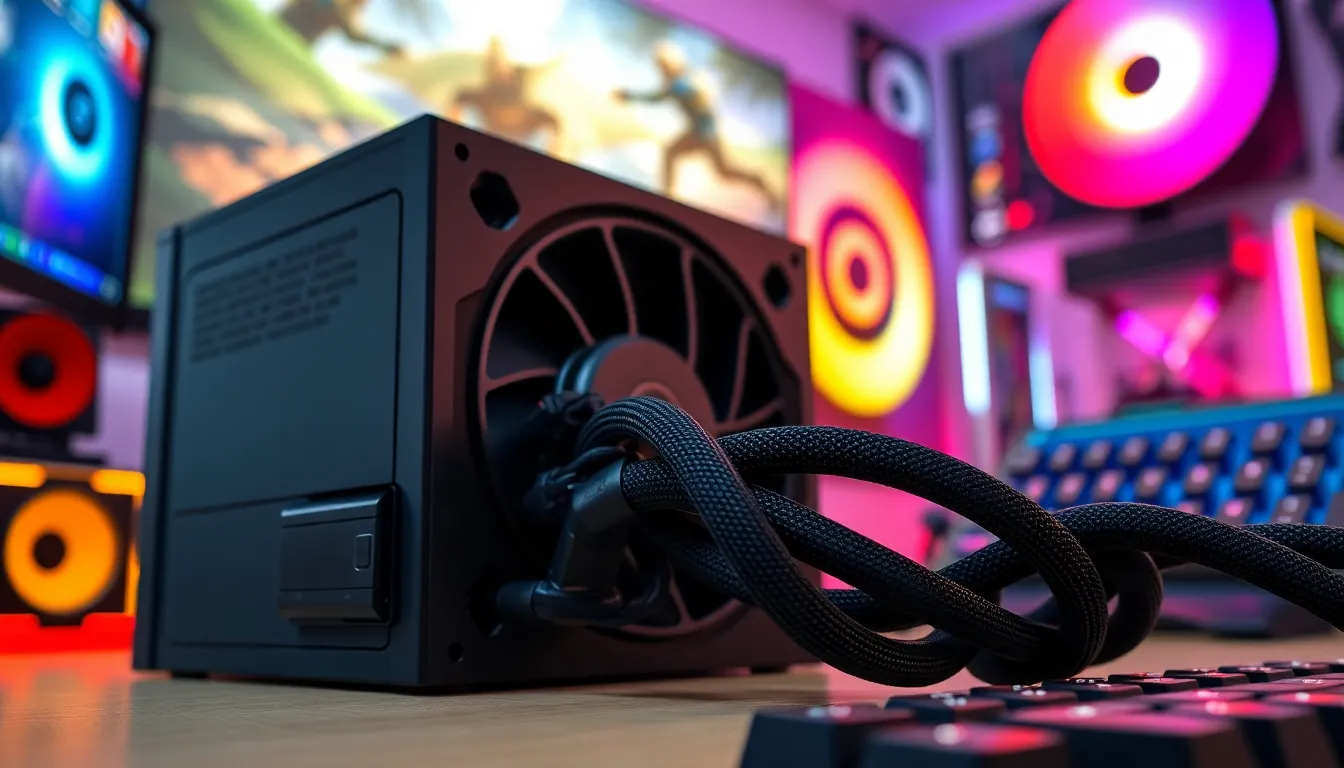When it comes to building the ultimate gaming PC, the power supply is often the unsung hero. Without it, those high-end graphics cards and speedy processors are just fancy paperweights. Think of the power supply as the heart of your rig, pumping the lifeblood of electricity to every component. If it’s weak or unreliable, your gaming dreams could come crashing down faster than a poorly timed jump scare.
Gaming PC Power Supply
A power supply unit, or PSU, serves as the vital component in a gaming PC. It converts alternating current from the wall outlet into direct current required by various components.
What Is a Power Supply Unit?
A power supply unit provides electrical power to the gaming PC. It plays a crucial role in regulating voltages and supplying stable power to components like the CPU, GPU, and storage devices. Each PSU features specific wattage ratings, such as 500W or 750W, indicating the maximum power input it can handle. Modular designs allow for customizable cable management, improving airflow and aesthetics. To ensure peak performance, users shouldn’t overlook efficiency ratings like 80 PLUS, which signify energy savings under load.
Importance of a Reliable Power Supply
A reliable power supply safeguards the entire gaming experience. It ensures consistent power delivery to avoid crashes and instability during intense gameplay. A low-quality PSU may lead to hardware damage over time, causing costly repairs or replacements. Furthermore, high-quality power supplies often come with warranties and better thermal management features. Users benefit from peace of mind, knowing their components receive steady power. Engaging in gaming or content creation under secure conditions enhances performance and enjoyment significantly.
Types of Gaming PC Power Supplies

Gaming PC power supplies come in different types, each serving specific needs and preferences for users. Understanding these types helps users make informed choices that enhance their gaming experiences.
Modular vs. Non-Modular Power Supplies
Modular power supplies offer flexibility with cables, allowing users to connect only necessary ones, thus improving cable management. They enhance airflow inside the case and simplify the installation process, promoting neatness and efficiency. Non-modular power supplies come with all cables permanently attached, increasing clutter. Installation may be simpler, but managing excess cables often becomes a challenge. Users concerned about aesthetics and airflow typically prefer modular options while opting for non-modular supplies to save costs.
Wattage Considerations
Wattage ratings are crucial for selecting a power supply. Ratings such as 500W or 750W indicate the maximum power a PSU can deliver. Insufficient wattage can lead to system instability and crashes during demanding tasks. Users should consider total power requirements of components, including CPU, GPU, and peripherals, when determining suitable wattage. It’s advisable to choose supplies with at least 20% more wattage than needed to accommodate future upgrades and enhance performance.
Key Features to Look For
Choosing the right power supply for a gaming PC involves several vital features that enhance performance and reliability. These features ensure the power supply meets the demands of high-performance components efficiently.
Efficiency Ratings
Efficiency ratings reflect how effectively a power supply converts AC to DC power. The 80 Plus certification system serves as a standard, with levels ranging from Bronze to Titanium. A power supply with a Platinum rating operates at 90% efficiency or higher, meaning less energy is wasted as heat. Selecting a higher efficiency rating not only reduces electricity costs but also contributes to cooler operation and longer component lifespan.
Protection Features
Protection features include safeguards against over-voltage, under-voltage, short circuits, and over-temperature situations. Many high-quality power supplies incorporate overcurrent protection, ensuring that components receive a steady flow of current without risking damage. Reliable power supplies also feature circuitry that automatically shuts down during a malfunction, preventing cascading failures that could affect the entire system. Prioritizing these features enhances the overall safety and stability of the gaming setup.
Connectors and Compatibility
Connector variety plays a key role in ensuring compatibility with different components. Standard connectors include 24-pin ATX for motherboards and PCIe connectors for graphics cards. Users should check the number of SATA and Molex connectors, especially if using multiple storage devices or peripherals. Selecting a power supply that offers modular options simplifies cable management; users can connect only the necessary cables, reducing clutter. Assessing compatibility with the motherboard and components ensures smooth integration in the gaming PC build.
Top Gaming PC Power Supply Brands
Several brands stand out in the gaming PC power supply market, known for their reliability and performance. These brands provide power supplies that support intense gaming sessions while ensuring stable power delivery to all components.
Brand A Overview
Brand A, a leader in the power supply sector, focuses on high-performance products. Known for robust build quality, their PSUs typically feature 80 Plus Gold certification, indicating exceptional energy efficiency. Customers highlight the modular design, which simplifies cable management and maximizes airflow in gaming setups. Additionally, Brand A’s models come equipped with multiple protection features, such as over-voltage and short circuit safeguards. With wattage options ranging from 500W to 1200W, users find suitable choices whether building a budget-friendly or a high-end gaming rig. The extensive warranty offerings further underscore Brand A’s commitment to quality and customer satisfaction.
Brand B Overview
Brand B has gained a reputation for delivering reliable and affordable power supplies. Emphasizing value, their products often carry 80 Plus Bronze certification, which balances efficiency and cost-effectiveness. Reviews frequently mention ease of installation, thanks to user-friendly connectors and a well-organized layout. Power capacities typically range from 450W to 850W, making them appealing for mid-range gaming rigs. Customers appreciate the included fan features, which promote thermal management during long gaming sessions. Also, Brand B provides various models with excellent reviews, showcasing performance across different gaming configurations.
Conclusion
Choosing the right power supply is essential for any gaming PC build. A reliable PSU not only ensures stable performance but also protects valuable components from potential damage. By selecting a unit with appropriate wattage and efficiency ratings users can enhance their gaming experience while preparing for future upgrades. The choice between modular and non-modular options can impact cable management and airflow, making it an important consideration. Ultimately investing in a high-quality power supply pays off in both performance and peace of mind, allowing gamers to focus on what they love most: immersive gameplay.

